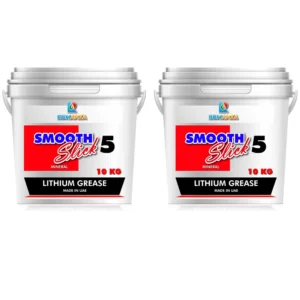Grease Oil Guide: Types, Applications, Uses, and Benefits
What is Grease Oil?
Types of Grease Oil
Understanding the different types of grease oil is crucial for selecting the right product for your specific needs. Here’s an in-depth look at the most common types:
1. Lithium-Based Grease
Properties: Lithium-based grease is known for its excellent water resistance, good thermal stability, and versatility. It can withstand moderate to high temperatures and is suitable for a wide range of applications.
Applications: Widely used in automotive chassis, industrial machinery, and household appliances. Lithium complex greases are particularly popular for their enhanced performance in high-temperature and high-load conditions.
2. Calcium-Based Grease
- Properties: Calcium-based grease offers superior water resistance and adhesion, making it ideal for wet or humid environments. It also has good mechanical stability and anti-corrosion properties.
Applications: Commonly used in marine equipment, agricultural machinery, and food processing plants. Calcium sulfonate grease, a subtype, is highly valued for its extreme pressure (EP) and anti-rust capabilities.
3. Polyurea Grease
Properties: Polyurea grease is known for its high thermal stability, oxidation resistance, and long service life. It is also non-conductive, making it suitable for electric motor bearings.
Applications: Ideal for sealed-for-life applications, high-speed machinery, and electric motor bearings. Its ability to resist oxidation and maintain performance over time makes it a cost-effective choice for many industries.
4. Silicone Grease
Properties: Silicone grease has a wide temperature range, chemical inertness, and compatibility with plastics and rubber. It is also water-resistant and non-conductive.
Applications: Used in O-rings, gaskets, rubber components, and electrical connectors. It is also popular in applications requiring non-reactive lubricants, such as medical devices and laboratory equipment.
5. Aluminum Complex Grease
Properties: Aluminum complex grease offers excellent extreme pressure (EP) properties, corrosion resistance, and thermal stability. It is also highly adhesive, making it suitable for heavy-duty applications.
Applications: Commonly used in steel mills, mining equipment, and heavy-duty industrial machinery. Its ability to withstand high loads and harsh environments makes it a preferred choice for demanding applications.
6. Bentonite Grease
Properties: Bentonite grease, made from clay thickeners, has a high dropping point and excellent thermal stability. It does not melt at high temperatures, making it ideal for extreme heat conditions.
Applications: Used in ovens, kilns, and high-temperature industrial processes. It is also suitable for applications where traditional grease would break down due to heat.
Applications of Grease Oil
Grease oil is used in a wide range of industries due to its versatility and effectiveness. Here’s a detailed look at its applications:
1. Automotive Industry
Uses: Lubricating wheel bearings, chassis components, universal joints, and suspension systems.
Benefits: Reduces friction, prevents corrosion, and extends the lifespan of vehicle components. High-performance greases also improve fuel efficiency by reducing energy loss due to friction.
2. Industrial Machinery
Uses: Lubricating gears, bearings, chains, and other moving parts in manufacturing plants and factories.
Benefits: Enhances operational efficiency, reduces downtime, and minimizes wear and tear on equipment.
3. Marine Industry
Uses: Protecting equipment from saltwater corrosion, lubricating winches, cables, and deck machinery.
Benefits: Ensures reliable performance in harsh marine environments and extends the life of marine equipment.
4. Aerospace Industry
Uses: Lubricating aircraft landing gear, actuators, control systems, and other critical components.
Benefits: Withstands extreme temperatures and pressures, ensuring the safety and reliability of aircraft systems.
5. Food Processing Industry
Uses: Lubricating equipment in food production lines, such as mixers, conveyors, and packaging machines.
Benefits: Safe for incidental food contact and compliant with health regulations, ensuring the safety and quality of food products.
Uses of Grease Oil
Grease oil serves multiple purposes across various sectors. Here are some common uses:
Reducing Friction: Minimizes wear and tear between moving parts, improving efficiency and longevity.
Preventing Corrosion: Forms a protective barrier against moisture and contaminants, reducing the risk of rust and corrosion.
Sealing Out Contaminants: Keeps dirt, dust, and debris away from critical components, maintaining cleanliness and performance.
Dampening Noise: Reduces operational noise in machinery, creating a quieter working environment.
Extending Equipment Life: Enhances the durability and performance of mechanical systems, reducing maintenance costs.
Benefits of Grease Oil
The benefits of grease oil make it a preferred choice for lubrication in many industries. Here are the key advantages:
Long-Lasting Lubrication: Grease oil adheres to surfaces, providing continuous lubrication over extended periods.
Versatility: Suitable for a wide range of temperatures, pressures, and environments.
Cost-Effectiveness: Reduces maintenance costs by minimizing equipment wear and downtime.
Environmental Resistance: Performs well in wet, dusty, or corrosive conditions.
Enhanced Safety: Reduces the risk of mechanical failures and accidents, ensuring safe and reliable operations.
Latest Trends in Grease Oil Technology
The grease oil industry is constantly evolving to meet the demands of modern machinery and environmental regulations. Here are some latest trends:
Bio-Based Greases: Made from renewable resources, these greases are eco-friendly and biodegradable, reducing environmental impact.
High-Performance Synthetic Greases: Designed for extreme conditions, such as high temperatures and heavy loads, offering superior performance and longevity.
Smart Greases: Embedded with sensors to monitor lubrication levels and equipment health in real-time, enabling predictive maintenance.
Nanotechnology: Incorporates nanoparticles to enhance lubrication properties and reduce friction at the molecular level, improving efficiency and performance.
How to Choose the Right Grease Oil
Selecting the appropriate grease oil depends on several factors:
Operating Conditions: Consider temperature, pressure, and environmental factors.
Equipment Requirements: Check the manufacturer’s recommendations for compatibility and performance.
Compatibility: Ensure the grease is compatible with other lubricants and materials used in your equipment.
Performance Additives: Look for additives that address specific challenges, such as extreme pressure or corrosion resistance.
Maintenance Tips for Grease Oil
Proper maintenance is essential to maximize the benefits of grease oil. Here are some tips:
Regular Reapplication: Follow the manufacturer’s guidelines for reapplication intervals.
Clean Equipment: Remove old grease and contaminants before applying new grease.
Monitor Performance: Check for signs of wear, noise, or overheating, which may indicate inadequate lubrication.
Store Properly: Keep grease in a cool, dry place to prevent degradation.
Final Thoughts
FAQs
Mixing greases with different thickeners or base oils can reduce performance and cause compatibility issues. Always consult the manufacturer’s guidelines before mixing.

Radiator Stop Leak UAE: Quick Fix for Vehicle Cooling System Leaks
Radiator Stop Leak UAE: Quick Fix for Vehicle Cooling System Leaks Discover More Introduction: The Unforgiving UAE Climate and Your Vehicle’s Lifeline The United Arab Emirates’ automotive landscape is defined by extremes. Ambient temperatures that regularly surpass 45°C (113°F), coupled with intense urban congestion and long, high-speed desert drives, create a perfect storm of thermal stress for every vehicle. In this environment, your engine cooling system is not merely a subsystem; it is the single most critical component preventing catastrophic engine failure.

What Type of Transmission Oil in UAE Does My Car Need? Your Complete Guide
What Type of Transmission Oil in UAE Does My Car Need? Your Complete Guide Discover More Navigating the vast, sun-baked highways of the United Arab Emirates—from the dynamic urban sprawls of Dubai and Abu Dhabi to the majestic desert dunes and the tranquil mountain passes of the Hajar range—places extraordinary mechanical and thermal stress on every component of your vehicle. While conscientious drivers often prioritize engine oil changes, the vital lifeblood safeguarding the transmission, the complex heart of your car’s

Guide to UAE Turbine Oil Selection Application & Management for Industrial Facilities
Guide to UAE Turbine Oil Selection, Application, and Management for Industrial Facilities Discover More In the hyper-competitive industrial landscape of the United Arab Emirates, where operational excellence directly translates to economic advantage, turbine lubrication represents a critical nexus of reliability engineering and strategic asset management. This comprehensive guide, developed with technical insights from Rumanza Lubricants, provides an unprecedented deep dive into the science, selection criteria, and life-cycle management of turbine oils specifically engineered for the extreme operating conditions of the

Synthetic vs. Mineral Hydraulic Oil in UAE : Which is Best for Your Operation?
Synthetic vs. Mineral Hydraulic Oil in UAE : Which is Best for Your Operation? Discover More Across the dynamic landscape of the United Arab Emirates—from the megaprojects of Dubai Marina to the intricate conveyor systems of Jebel Ali Port, from the massive hydraulic shovels in Al Dhafra quarries to the precision automated lines in Abu Dhabi’s industrial cities—the silent, powerful force of hydraulics is indispensable. These systems convert fluid power into monumental force and precise motion. At the core of

What is a Pour Point Depressant? | Benefits, Uses & How It Works Mechanism
What is a Pour Point Depressant? | Benefits, Uses & How It Works Mechanism Discover More In the intricate world of lubricant formulation, few additives play as critical yet understated a role in cold-weather operability as Pour Point Depressants (PPDs). These specialized chemical compounds are the linchpin that prevents machinery from seizing up when temperatures plummet. This in-depth guide goes beyond the basics, exploring the sophisticated chemistry, detailed mechanism, nuanced benefits, and practical considerations of PPDs. We will also examine the

Guide to Gasoline Engine Oils for UAE’s Extreme Climate: Engineering Peak Performance
Gasoline Engine Oils for UAE’s Extreme Climate: Engineering Peak Performance Discover More In the heart of the Arabian Peninsula, the United Arab Emirates stands as a testament to human ambition, with its engineering marvels and endless highways. Yet, this environment of soaring achievement is also one of the most punishing on Earth for machinery. For your vehicle—whether a nimble city sedan, a powerful family SUV, or a high-performance sports car—the UAE’s climate is a relentless adversary. The choice of engine

What are Polyol Ester Oils & Lubricants – Properties & Applications
What are Polyol Ester Oils & Lubricants – Properties & Applications Discover More In the intricate world of industrial machinery, automotive engines, and advanced refrigeration systems, the choice of lubricant is not merely a maintenance task—it’s a critical engineering decision. While conventional mineral oils have served us for over a century, the demands of modern technology require fluids that can perform under extreme pressure, temperature, and environmental stress. This is where synthetic lubricants, specifically Polyol Ester oils, come to the forefront.

Guide to Choosing the Right Lithium Complex Grease in UAE
Guide to Choosing the Right Lithium Complex Grease in UAE for Unbeatable Performance Discover More In the heart of a region defined by its ambition and extreme climate, the machinery that builds and powers the UAE operates under immense pressure. From the towering cranes sculpting Dubai’s skyline to the massive haul trucks in Abu Dhabi’s industrial zones and the relentless conveyor systems in Jebel Ali Port, every moving part is a critical link in the chain of progress. Protecting these
